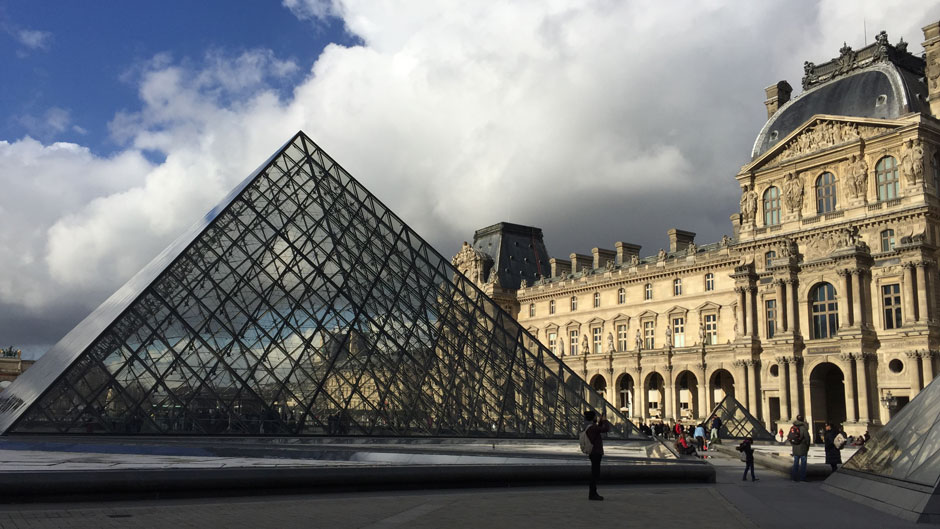The changes in perspective aren’t nearly as obvious as their markedly improved French. But after five months of study in Paris, some of the 16 students who inaugurated the University of Miami’s UParis study abroad program returned to campus this fall viewing life, and how to live it, a bit differently.
Neha Baddam, who is minoring in French, couldn’t help but notice how people in France, especially in Paris where she took classes at Sorbonne University, devote their undivided attention to whatever they do. It’s a habit she picked up and hopes to keep.
“In the U.S., sometimes we’re so rushed to finish everything and move onto the next thing that we never really take in an experience,” said Baddam, a senior marketing major who reveled in becoming a “regular” at local restaurants, cafes, parks and shops. “One of the things I’ve noticed myself doing is trying to be more present, and not always as focused on what comes next.”
Frank Hedgepeth, who is majoring in political science and African/African American Studies, returned to Miami with a new resolve to help newcomers who are navigating a new language and country. His epiphany came while struggling with his mangled French to update his American cell phone for use in France.
“I got through the encounter, but I left feeling defeated, unwelcome and wondering, ‘If I could feel that helpless in a situation where the stakes were really pretty low, imagine trying to get health insurance or buy a home or apply for citizenship when you can’t communicate,” Hedgepeth recalled. “This experience isn’t specific to UParis, but it exponentially increased my capacity for patience and my willingness to offer help in situations involving miscommunications with people who are learning English.”
Already one of the U’s most popular study-abroad programs, UParis is now recruiting students for its second study-abroad semester, which begins January 2019 and is open to all students across the U, regardless of their language skills. Applications are due September 15.
“It’s been really successful. Our first cohort consisted of 16 students from across the University—from the marine school to the Business School to the College of Arts and Sciences—and some who are French majors and some who have never taken a French class,” said Associate Professor Logan J. Connors, director of the Undergraduate Studies in French and UParis programs, who launched the program with the Office of Study Aboard’s Jess Driemeier last year. “They attended five different Parisian universities, taking a range of courses, from art history to marketing to computer science to film studies to French language and literature, in English or French.”
As will the next cohort, the inaugural group began the semester in Paris in January—and in the snow—with a mandatory two-week intensive French language class. They also were required to take Connors’ UParis core seminar, which co-taught by program assistant and Ph.D. candidate Fély Catan, combines fundamental knowledge on French history and cultural studies with an individualized research project about Paris but grounded in each student’s scholarly interests.
For example, Baddam’s research explored why French haute couture is behind the rest of the fashion industry in embracing models of different races, ethnicities, body types and sizes.
“My question was basically, while the rest of the world is changing and adapting, why is French haute couture remaining the same?” said Baddam, who chose to live with a French family during her stay. “I focused on social factors such as the idea of a ‘typical French woman’ that is known to the world, the potential for vanity in the French, and especially Parisian, society while also evaluating the economic side.”
Hedgepeth, who lived with fellow students in an apartment, picked another weighty topic, about the negative impact France’s historic anti-racialism has on current activist movements for racial justice. He settled on it before seeing the eye-catching Monument to the Abolition of Slavery in the Americas outside the school where the intensive French classes were held. It is a huge pair of shackles presumably shed by French slaves in Haiti and the Caribbean.
“In France, the government and the political establishment try to avoid identifying people by race because they think it’s divisive,” Hedgepeth said. “But my main conclusion was that, by taking race out of the conversion, it erases France’s colonial and white supremacist history, making it harder for racial justice activists to form cohesive movements today. The monument is striking but it seems they put it up to close the book on slavery.”
His topic aside, Hedgepeth readily admits that studying was only a small part of the study abroad program. With his classes held only two days a week and Paris so centrally located, he had plenty of time to explore the rest of France and much of Europe. Among his favorite trips was one to Normandy with fellow UParis students who visited the D-Day museum, the U.S. military cemetery on Omaha Beach, and a small coastal town that felt like a time warp.
“The neighborhood we stayed in felt like it hadn’t changed in over a hundred years,” Hedgepeth said. “Late at night there were no lights on, no cars around, and fog so dense that you couldn’t see 10 feet in front of you. I had never heard or felt silence that complete. It made me feel like I was on a different planet.”
For Theodore “Teddy” Dunn, a history, economics and French major who accompanied Hedgepeth to Normandy, simply walking the tree-lined streets or along the Seine and seeing people at Parisian cafés remain cherished memories—reminding him to seize every day, no matter where he is or what he’s doing.
“I got into a mindset that I wouldn’t waste a day abroad because it’s a very privileged and once-in-a-lifetime opportunity,” said Dunn, who lived in a French home and researched the Algerian massacre in Paris for his independent project. “So, I thought, ‘Why not apply that to everyday life and not just while I study abroad in a foreign country?’’’

